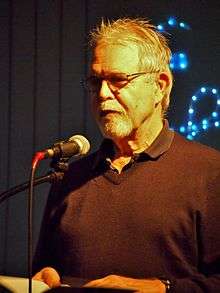Joseph Millar
Joseph Millar is an American poet. He was raised in western Pennsylvania and after an adult life spent mostly in the SF Bay Area and the Northwest, he divides his time between Raleigh, NC and Richmond, CA.[1]
Joseph Millar | |
|---|---|
 | |
| Occupation | Poet |
| Nationality | American |
| Citizenship | United States of America |
| Alma mater | Johns Hopkins University |
| Genre | Poetry |
| Spouse | Dorianne Laux |
| Children | 4 |
Life
Millar received an MA degree from Johns Hopkins University in 1970.[2] He has worked as a telephone installation foreman and commercial fisherman and in 1997 gave up this blue collar life to try his hand at teaching. He has poems about fatherhood, labor, relationships and the life of the American man in the 20th Century.
His work has appeared in many magazines and journals, including The Alaska Quarterly Review, "DoubleTake," Ploughshares,Poetry International, and Prairie Schooner, The Southern Review, TriQuarterly, New Letters, Raleigh Review and Shenandoah.
He has taught at Mount Hood Community College, Oregon State University.[4] He now teaches in the MFA in Writing Program at Pacific University and the Esalen Institute.
He is married to poet Dorianne Laux; they divide their time between Raleigh, North Carolina and Richmond, CA.
Awards
In 2002, Millar was awarded a Grant from the National Endowment for the Arts, and in 2008 his work won a Pushcart Prize. He has also been the recipient of grants from the Montalvo Center for the Arts and from Oregon Literary Arts. In 2012, he was selected as a Guggenheim Fellow.[5]
Works
- Overtime: Poems, Eastern Washington University Press, 2001, ISBN 9780910055741, a finalist for the Oregon Book Award,
- Fortune, Eastern Washington University Press, 2007, ISBN 9781597660266,
- Blue Rust, Carnegie Mellon University Press, 2012, ISBN 9780887485497. [6][7]
- Kingdom, Carnegie Mellon University Press, 2017, ISBN 978-0887486210
- chapbooks
- "Slow Dancer", Cherry Valley Editions, 1992,
- "Nightbound", Idaho Review Press, 2009
- "Bestiary," from Red Dragonfly Press, 2010.
References
- http://www.josephmillar.org/about.html
- http://www.poetryfoundation.org/bio/joseph-millar
- https://www.pbs.org/wgbh/poetryeverywhere/millar.html
- http://www.gf.org/fellows/all-fellows/joseph-millar/
- J. Scott Brownlee (January 10, 2012). "BLUE RUST by Joseph Millar". Rattle.
Elegiac snap-shots of 1960’s-1970’s industrial America like this one can be found throughout Blue Rust and make the collection’s title, given the ongoing economic downturn of the United States, seem particularly apt.
- Tim McBride (Fall 2012). "Review of Blue Rust". Prairie Schooner.
In his remarkable third collection, Blue Rust, he lays down the shield of irony without taking up the consolations of easy sentiment or posturing despair.